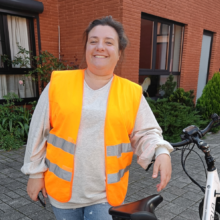
Volunteering at The Cycling School: commitment with impact
At The Cycling School, Mobiel 21 works with cheerful volunteers to teach adults how to ride a bike. One of those volunteer instructors is Jill. We asked her why she enjoys this volunteer work so much.
Hey Jill. We know you within Mobile 21 mainly as a digital marketing strategist at Statik. But recently you also started volunteering at The Cycling School. Why that choice?
"When I decided to work less a while ago, I started looking for volunteer work where I can help people and be outside, away from the computer screen. I was already familiar with De Fietsschool through my work at Statik. After talking to some employees of De Fietsschool, I was completely convinced to join. Because I do everything by bike myself and therefore know what freedom cycling gives - not only in your spare time but also to get to work or to do shopping."
So did you start immediately as a volunteer cycling instructor?
"Before you start volunteering at The Cycling School, you first receive a short training. In a small group of volunteers, we learned step by step how to teach people how to cycle: start stepping, get on the pedals, slalom... We also got a refresher on traffic rules."
"The training was a real eye-opener for me! If you learned to ride a bike as a child and are on your bike just about every day, it's all very natural. For an adult who has perhaps never touched a bike before, it is of course less straightforward. So as I cycled home after training, it struck me how complex our traffic actually is. Just look at how many traffic signs and road markings there are."

Suddenly, participants are cycling around the teaching square. Then you not only see the pride on their faces, but feel it yourself. That's what you do it for as a volunteer.
vrolijke vrijwilliger bij De Fietsschool
How did the first lesson you supervised go?
"The first lesson I went one-to-one with someone who came to the class on the recommendation of her daughter, who had previously learnt to ride a bike at De Fietsschool. I showed her the parts of the bike and then we walked around a bit with the bike in hand. That way the lady could already get used to the bike for a while."
"Then she took a seat on the saddle. Low and with her feet on the ground, to get over the initial fear. I really noticed that during the first lesson, by the way: when you're just learning to ride a bike, it's very scary. People are afraid of falling, of hurting themselves. So as a volunteer, you have to make sure that people not only learn to ride a bike technically, but also overcome their fear."

Overcoming fears together undoubtedly creates a personal bond too.
"Volunteering at The Cycling School is indeed very connecting. One of the nicest moments was when I went for my first solo bike ride with someone on the street. After one round of cycling, she immediately wanted another round, and then another. At the end of the lesson, she came to give me a hug. She told me she had had a great time. That's nice to hear, and a sign that she was comfortable on the bike. So I was happy with that feedback, and also happy that my first guidance on the street had gone well immediately."
"When just about all the participants are on the pedals and cycling around the teaching square... That's nice to see. Suddenly they can ride a bike! I not only saw that pride on their faces, but felt it myself. Those beautiful moments, that's what you do it for as a volunteer."
Become a volunteer too
To offer cycling lessons all over Flanders, De Fietsschool works with cheerful volunteers. They give cycling lessons in their city or municipality, close to home, thus helping others in the saddle.
And you too can volunteer in many ways. Fun and laughter guaranteed!
Want to know more about The Cycling School?
The school's network manager, Pieter Vanden Abeele, is happy to provide you with more information. Submit your question using the form below, and he'll get back to you soon.
Related insights

What data from Cycling School Leuven teach us about the success of cycling lessons
What factors ensure that a person can actually cycle after a series of cycling lessons? Which factors increase the chances of success? Cycling School examined five years of data from cycling courses in Leuven and mapped out for the first time what really counts.

What makes research by Mobiel 21 so unique?
Mobiel 21 conducts mobility research that translates social signals and policy questions into concrete action points. Cycling behaviour, mobility poverty or support for local mobility measures? Together with citizens, policymakers, companies and all kinds of other organisations, we arrive at new insights. In an accessible and people-oriented way. Discover how we work.

Fighting transport poverty
Everyone has the right to move freely and participate in society. We support people facing transport disadvantages by identifying vulnerable groups, and seek to integrate equity into sustainable mobility.